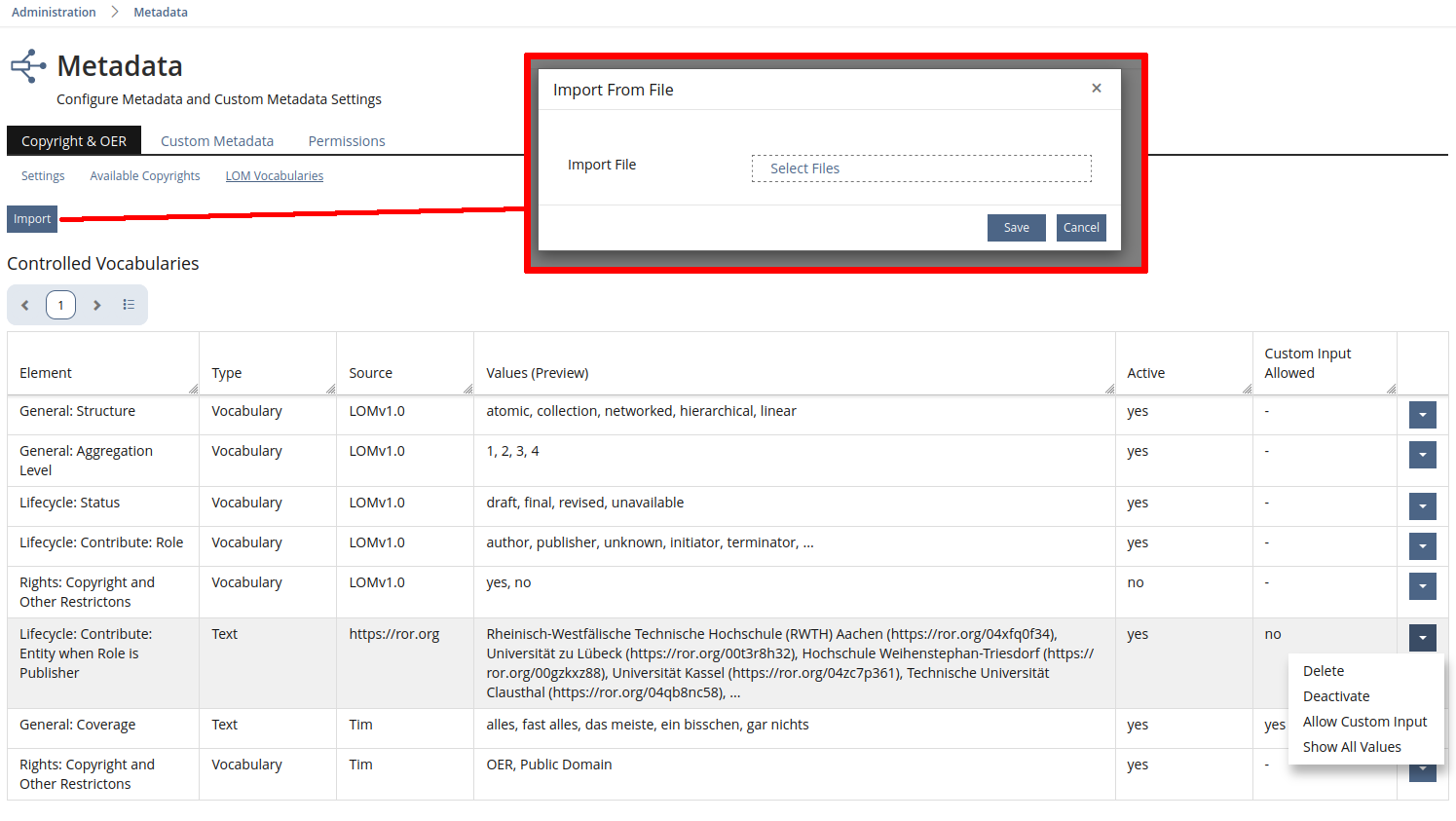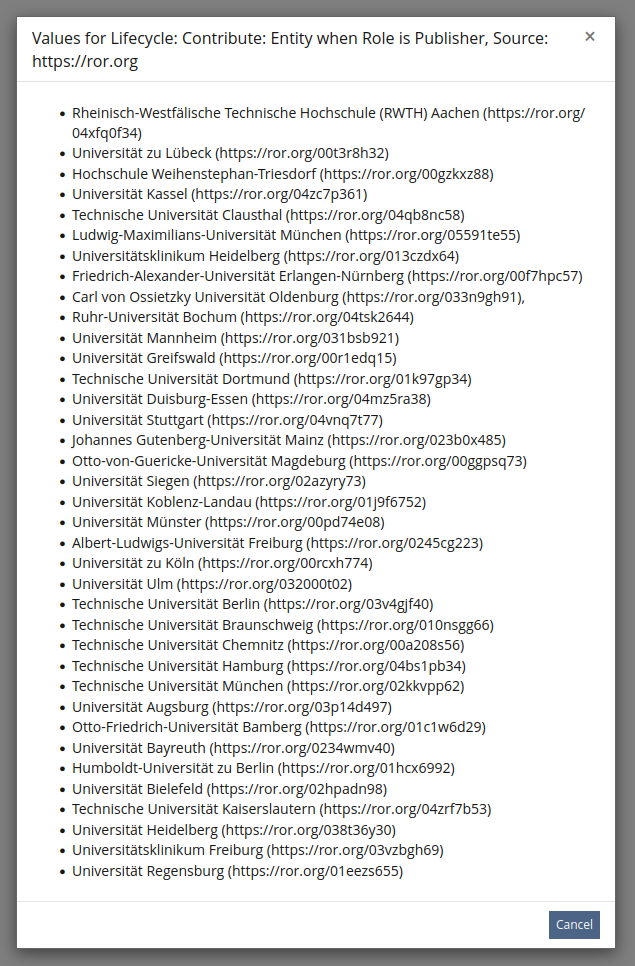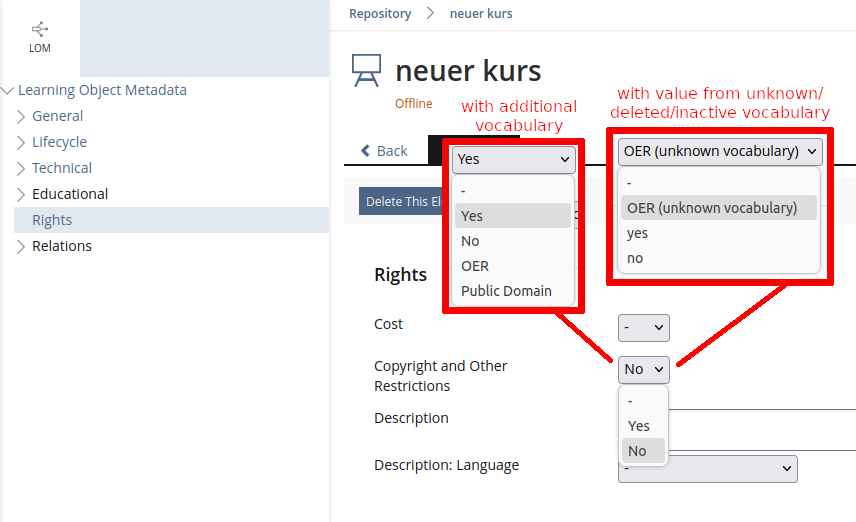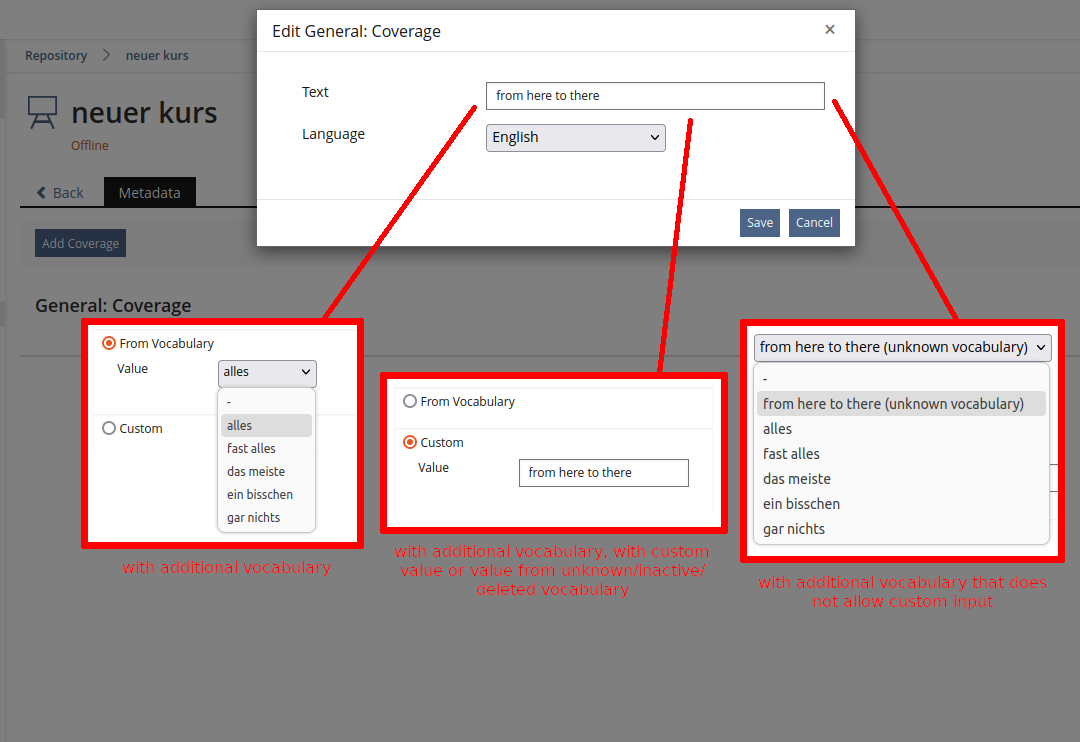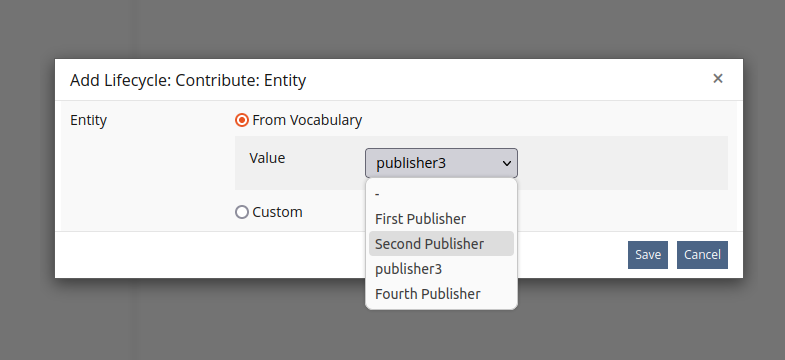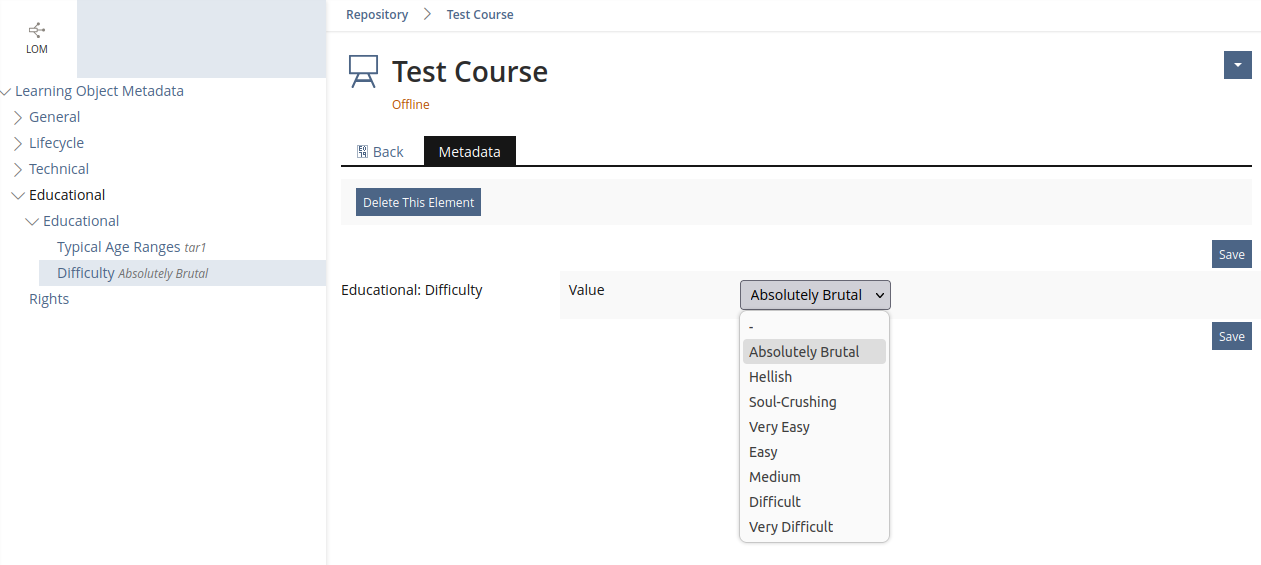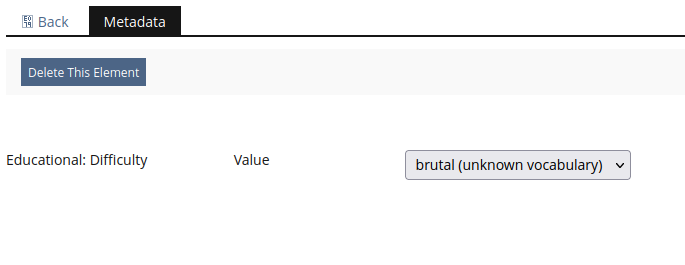Feature Wiki
Tabs
Infrastructure for Adding Metadata from Controlled Vocabularies
Page Overview
[Hide]1 Initial Problem
OER ecosystems rely on standardized metadata to make OER searchable and shareable. This includes in particular community-specific controlled vocabularies for data like audience role, educational level, or subject groups, study areas and study subjects of the OER (see also the subjects and organizations in the OERSI git).
Currently, ILIAS offers no way to support these kinds of vocabularies. This makes it hard to fill out the metadata of OER correctly and effectively.
The necessity to support controlled vocabularies to facilitate such ORCA Workflows was worked out in workshops with personnel from the hbz, among others. This request only covers the needed infrastructure, it does not transform and import any specific vocabulary.
2 Conceptual Summary
Controlled vocabularies can be imported in the Metadata administration, which are then offered to users in the LOM editor. Imported vocabularies are displayed alongside the vocabularies that are already included in the LOM standard. This request only covers the infrastructure to do so, no specific vocabulary (except those native to LOM) will be pre-installed in ILIAS.
Controlled vocabularies can only be imported from xml files in a specific format, they can not be created or edited via the UI in ILIAS. Each xml file contains a single vocabulary. The following information is included in such an import file:
- the LOM Element that the vocabulary should apply to
- the source of the vocabulary
- the list of terms included in the vocabulary, each term optionally with a label
For some elements, vocabularies can be made conditional on the value of a specific other element (see below for details). In this case, the terms in a vocabulary are only offered if that other element has the correct value. In this case, that value also needs to be included in the import file. If that value is not provided, the vocabulary is not conditional. For an example of conditional vocabularies in action, see technical: requirement: orComposite.
Not all elements are eligible for controlled vocabularies. To not make the LOM editor overly complicated, they should be limited to elements of the type 'vocabulary value' as per the LOM standard (for which a dropdown if offered in the LOM editor), and a selection of elements that allow free text input. For the former, the LOM editor will simply offer an expanded dropdown, and for the latter a selection between a dropdown and a custom text input.
Excluded are text elements that either serve to identify a specific object or entity (e.g. general > title), or that exist to hold additional information without a specific semantic purpose (e.g. technical: installationRemarks or any description).
General
- structure
- aggregationLevel
- keyword
- coverage
- identifier: catalog
LifeCycle
- status
- contribute: role
- contribute: entity, conditional on contribute: role
MetaMetadata
- contribute: role
- contribute: entity, conditional on contribute: role
- identifier: catalog
- metadataSchema
Technical
- technical: requirement: orComposite: type
- technical: requirement: orComposite: name, condtional on technical: requirement: orComposite: type
- otherPlatformRequirements
- format
Educational
- interactivityType
- learningResourceType
- interactivityLevel
- semanticDensity
- intendedEndUserRole
- context
- difficulty
- typicalAgeRange
Rights
- cost
- copyrightAndOtherRestrictions
Annotation
- entity
Relation
- kind
- resource: identifier: catalog
Classification
- purpose
- keyword
- taxonPath: source
- taxonPath: taxon: entry
Controlled vocabularies will not be exported along with ILIAS objects. It might then be the case that the metadata of an ILIAS object contains values from unknown (or deleted) vocabularies. ILIAS should handle these values graciously, they should never be hidden or silently deleted. See below for more details.
If the same controlled vocabulary is present on both the installation where the object is exported and where it is imported, the value is assigned properly (and displayed with the associated label if there is one).
Controlled vocabularies can be deleted or deactivated. In both cases, their terms are not offered in the LOM editor anymore. Further, vocabularies for text LOM elements can disallow custom inputs when they are active. The following restrictions apply:
- The vocabularies that are included in the LOM standard (with source 'LOMv1.0') can never be deleted.
- Vocabularies can not be deactivated or deleted if they are the last active vocabulary for their element, except for text elements.
3 User Interface Modifications
3.1 List of Affected Views
- Administration > Search and Find > Metadata > Copyright & OER > LOM Vocabularies
- The full LOM Editor in the 'Metadata' tab of any object
3.2 User Interface Details
In the 'Copyright & OER' tab of the Metadata administration, in a new subtab 'LOM Vocabularies', all vocabularies are displayed. This includes both imported ones and those included in the LOM standard.
The vocabularies are shown in a data table with the following columns:
- Element: Which Element does the vocabulary belong to? If applicable, this includes conditions on other elements.
- Type: Is the element restricted to values from vocabularies as per the LOM standard, or is free text input allowed?
- Source: Source of the vocabulary, 'LOMv1.0' for those included in the standard.
- Values: Shows the first five terms included in the vocabulary. If the terms come with a label, the label is displayed first with the actual value behind it in brackets.
- Active: Are the terms from the vocabulary offered in the LOM editor? The default is 'yes'.
- Custom Input Allowed: If this vocabulary is active, is custom input allowed in addition to it? Only applicable to text LOM elements. The default is 'yes'.
For all rows, the table offers a single action to 'Show All Values', which leads to a modal where all terms are displayed in a listing. Where applicable, the table also offers single actions to delete vocabularies, (de-) activate them, or (dis-)allow custom input.
'Delete' shows a confirmation modal, where the first five terms of the to be deleted vocabulary are listed as interruptive items, and the following text is shown: Are you sure you want to delete this vocabulary for the element {ELEMENT} from source {SOURCE}? Note that this does not delete already existing values in the learning object metadata of ILIAS objects.
Above the table, an 'Import' button is offered. It opens a modal with a file input, where additional vocabularies can be imported.
In the LOM editor, importing a controlled vocabulary changes the offered input elements as follows:
- For elements that normally offer a dropdown: The values offered in the dropdown are those from all active vocabularies. They are shown by their value, if available.
If an element carries a value from an unknown, deleted, or inactive vocabulary, that value is also offered with the token 'unknown vocabulary' appended in brackets (but not any other values from e.g. the same inactive vocabulary). - For elements that normally offer text input: Two radios 'From Vocabulary' and 'Custom' are offered. The latter offers a text input, the former a dropdown with the values of all active vocabularies.
If an element carries a value from an unknown, deleted, or inactive vocabulary, that value is simply treated as custom input, and shown in the corresponding text field.
If at least one vocabulary of the element is does not allow custom input, only a dropdown is offered. In this case, the behavior is identical to that of elements that normally offer dropdowns.
3.3 New User Interface Concepts
No new interface concept.
3.4 Accessibility Implications
The use of KS elements is assumed to ensure full accessibility
4 Technical Information
The database tables of MetaData need to be expanded such that the source of a vocabulary value can be persisted properly. Also, columns for the values themselves need to allow a higher length: right now, they are pretty much exactly the length they have to be for the native LOMv1.0 vocabularies. It might be necessary to restrict the length of values in controlled vocabularies on import.
The token 'LOMv1.0' should be forbidden as the source of vocabularies on import, because it is reserved for the pre-installed, native vocabularies.
Some elements have special requirements, they e.g. can't be deleted or come pre-filled with a specific value. These requirements must be reflected in the corresponding input elements, regardless of whether any additional vocabularies are active or not.
The xml files for importing vocabularies must be created with the following format:
| |
5 Privacy
Compared with normal LOM Metadata no additonal personal data is stored.
6 Security
No security issues are foreseen.
7 Contact
- Author of the Request: Tödt, Alexandra [atoedt]
- Maintainer: Meyer, Stefan [smeyer]
- Implementation of the feature is done by: Schmitz, Tim [tschmitz]
8 Funding
If you are interest in funding this feature, please add your name and institution to this list.
9 Discussion
Tödt, Alexandra [atoedt] The OER-Workshop on 2022-10-12 came up with several remarks:
- Participants appreciated the feature.
- Some participants suggested further controlled vocabularied: AG Mediendistribution und Dokumentation, Psychology and Regensburg, Dewey Decimal Classification
- Coyright licenses could be also used in the Rights section.
- There was as suggestion that used must be forced to use the controlled vocabulary and offering no text input to save other pre-existing or imported entries. This was controversal.
Schmitz, Tim [tschmitz], 13 MAR 2024: I overhauled the article based on the OER Feature Workshop on 06 MAR 2024.
Kunkel, Matthias [mkunkel], 09 APR 2024: Thanks for this elaborated feature request. And for a feature that is highly appreciated when using metadata. But one aspect is not clear to me:
- Is information about entries from controlled vocabularies kept when exporting an object and can it be restored at the target installation when the controlled vocabulary is existing there, too? Example:
- Installation A offers controlled vocabulary C and learning module L is using metadata entries from C. Now module L is exported and imported on installation B where c.v. C is existing as well. Are the entries from C are recognised on installation B and properly assigned - or not?
- We have to consider that such a feature will often be used for content that is either OER or offered by content providers. In both cases, no one likes to restore metadata after an import. We already have this problem with CC licences. Even if the CC licence already exists on the target installation it is not recognised. Someone has to reassign it manually. If we go this way for the metadata from controlled vocabularies, the feature won't get big acceptance IMHO.
Schmitz, Tim [tschmitz], 10 APR 2024: No values should ever be lost on import: If the same controlled vocabulary is present on both the installation where the object is exported and where it is imported, the value is assigned properly (and displayed with the associated label if there is one). Even if the vocabulary is not there on import, the value is still shown in the LOM of the object with the flag 'unknown vocabulary'. In both cases, the value is always kept in the LOM, the difference will really just be in presentation (with a label or just the raw value).
I've added a paragraph to the article to hopefully explain this a bit better.
JourFixe, ILIAS [jourfixe], 29 APR 2024: We highly appreciate this suggestion and schedule the feature for ILIAS 10 / trunk.
10 Implementation
During the implementation of this feature it became clear that it would improve the behavior of the LOM editor if preset copyrights on the installation would be treated as a controlled vocabulary for the element rights > description > string, if Copyright Selection is active. Values of this vocabulary are the internal identifiers of the presets, and labels their titles.
Due to technical complexity, and to exclude possible misconfigurations of the vocabularies, the list of eligible LOM elements above had to be restricted:
- The widespread usage 'general > keywords' beyond the MetaData component made consistently implementing vocabularies for it prohibitively complicated. If required, this should be tackled in the future as its own feature.
- 'lifeCycle: contribute: entity, conditional on contribute: role' and 'technical: requirement: orComposite: name, condtional on orComposite: type' had to be restricted to specific values of the condition, 'publisher' for the former and 'browser' or 'operating system' for the latter.
- 'metaMetadata: contribute: entity, conditional on contribute: role', 'metaMetadata: contribute: role', and 'lifeCycle: contribute: role' do not allow vocabularies to exclude misconfigurations related to the conditions.
For more details on the implementation, see the documentation.
Test Cases
Test cases completed at 2023-10-09 by Spirou, Ilias [ispirou]
Privacy
Information in privacy.md of component: no change required
Approval
Approved at 11 OCT 2024 by Vorkauf, Klaus [KlausVorkauf].
Last edited: 17. Oct 2024, 16:41, Schmitz, Tim [tschmitz]
